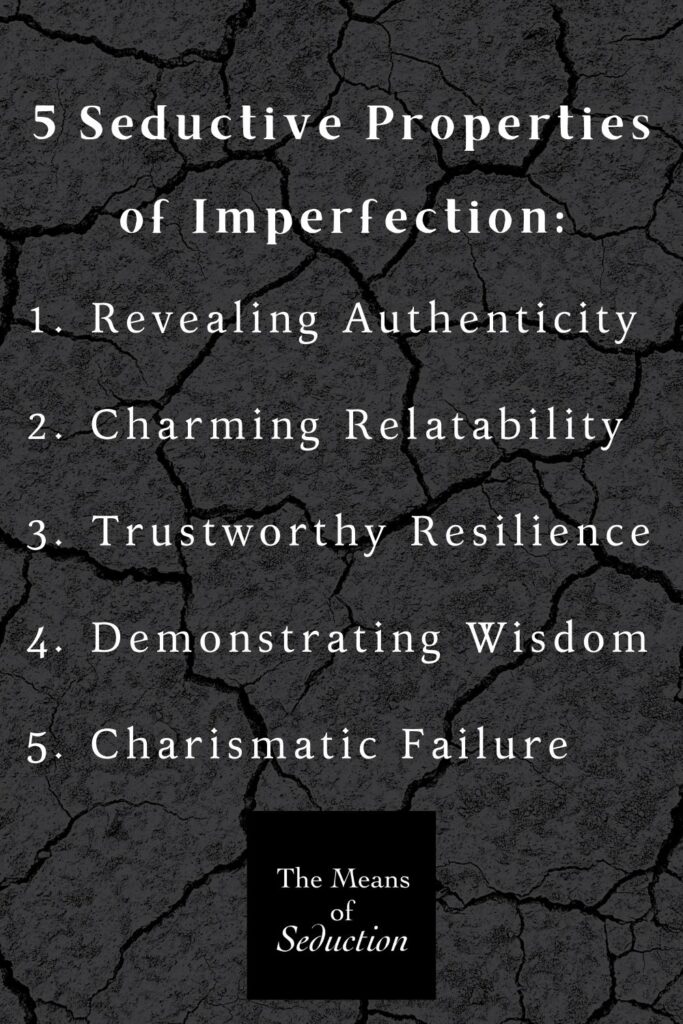In a world that glorifies flawless façades, there exists a captivating allure in the embrace of imperfection. Where imperfection and seduction intersect, we find the strategic manipulation of qualities such as authenticity, relatability, resilience, and wisdom. Yes, you have the ability to take your failures and use them to your advantage. These are the means of seduction through intentional displays of imperfection. Here, failure becomes an element of charisma. This is where seducers ensure all their outcomes are received favorably, even their blunders.
The Allure of Imperfection & The Transformation of Failure into Charisma
1. Revealing Authenticity
Imperfection holds a practical allure in its ability to reveal authenticity. In a world of curated perfection, embracing flaws displays genuineness. Genuineness, at least the appearance of it, promotes feelings of safety for those around you. This can later be used to create situations and conversations that advantage you, because others will be more likely to listen if they are not feeling insecure, exposed, or unsafe around you.
2. Charming Relatability
Imperfections make people appear more approachable and relatable. When people readily admit their mistakes and acknowledge their shortcomings, it opens the floor for empathy and understanding. Drawing people closer through shared experiences of imperfection and failure makes them feel comfortable, as if they are on the same level as you. When seducers level the field enough to be seem as “relatable”, they stop being “unattainable”, “unrealistic”, and “intimidating”. Earning trust is easier where commonality is perceived.
3. Trustworthy Resilience
Those who face their mistakes with composure and collectedness come across as reliable and consistent to others. Weathering storms like seasoned sailors, seducers use the perception of their calmness and coolness to establish themselves as confident decision-makers, planners, and executors. The way some people, like seducers, handle their mistakes can be inspiring for others to watch. Ever seen someone stumble and laugh it off? It is intoxicating to see such self-confidence unscathed. Remaining steadfast and proactive, rather than falling apart, allows seducers to become a source of motivation for others. Trust and credibility will go a long way, eventually earning you positions of influence and power, if you can demonstrate an acknowledgement of your failures without letting them drag you down.

4. Demonstrating Practical Wisdom
Embracing one’s failure with grace and resilience reflects maturity and personal growth. When someone expertly navigates life’s many setbacks without falling apart, it demonstrates a depth of understanding that could only be acquired through experience. Seducers benefit from appearing experienced and rational. People are naturally drawn to stories of grit, perseverance, and trials by fire, because most people can identify with the struggles and ambitions of the successful phoenix who rises from the ashes. A seducer embracing failure communicates to others that he or she values individual progress over perfection, and positions the seducer to be more credible, trustworthy, reliable, and relatable because of it.
5. Transforming Failure into Charisma
Adopting an attitude of resilience in the face of failure is charismatic. Instead of acting defeated, seducers appear to take their failures in stride and demonstrate the kind of fortitude that inspires admiration in onlookers. Humility is an attractive quality. Transforming failure into charisma is strategic. By openly acknowledging mistakes and setbacks, seducers can reshape their public images favorably, thus turning their perceived shortcomings, failures, or imperfections into traits like authenticity, relatability, resilience, and wisdom. These qualities have a humanizing effect. Leveraging failure as a steppingstone for personal growth – and openly sharing this journey as a model of authenticity, relatability, resilience, and wisdom – can provide seducer’s with an irresistible charm and the perceived charisma that comes from watching someone fall then rise again and again.
